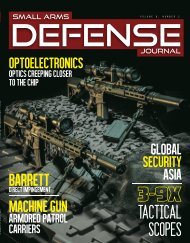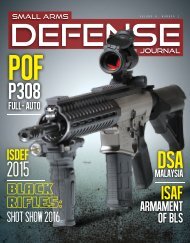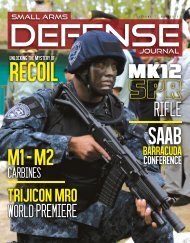SAR 20#2
Create successful ePaper yourself
Turn your PDF publications into a flip-book with our unique Google optimized e-Paper software.
y Teresa G. Ficaretta, Esq.<br />
& Johanna Reeves, Esq.<br />
Legal News from the Nation’s Capital<br />
<strong>SAR</strong> Vol. 20, No. 2 MARCH 2016<br />
16<br />
GCA Firearms Restrictions—<br />
Who Is a Prohibited Person?<br />
Part II: 18 U.S.C. § 922(g)(5)-(9)<br />
In Vol. 20, No. 1, we provided readers<br />
with an overview of Federal firearms<br />
disabilities imposed under the Gun<br />
Control Act (GCA), 18 U.S.C. Chapter<br />
44. Because there are 10 categories of<br />
“prohibited persons” under the GCA, we<br />
addressed 5 of the disabilities in Part I<br />
of the article, and this article addresses<br />
the remaining 5 disabilities as Part<br />
II. As stated in Part I, it is essential for<br />
Federal firearms licensees (FFLs) to<br />
have a working knowledge of this area<br />
of the law to avoid transferring firearms<br />
or ammunition to prohibited persons<br />
and aiding and abetting a prohibited<br />
person in unlawfully possessing these<br />
items. Caution must be exercised in<br />
this area not just for potential purchasers<br />
of the FFL’s products, but also for<br />
employees who possess firearms and<br />
ammunition for purposes of carrying out<br />
the FFL’s business.<br />
This article will discuss the prohibited<br />
persons described in 18 U.S.C. § 922(g)<br />
(5)-(9), which includes illegal and nonimmigrant<br />
aliens; persons dishonorably<br />
discharged from the military; renunciants<br />
of U.S. citizenship; persons subject<br />
to domestic violence restraining orders,<br />
and persons convicted of misdemeanor<br />
crimes of domestic violence.<br />
I. GCA Categories of Prohibited Persons<br />
§ 922(g)(5)-(9)<br />
A. 18 U.S.C. § 922(g)(5) – Illegal Aliens<br />
and Nonimmigrant Aliens<br />
Section 922(g)(5) includes two separate<br />
and distinct disabilities. The first<br />
applies to “aliens” who are illegally or<br />
unlawfully in the United States. The<br />
second applies to aliens who have been<br />
admitted to the United States under a<br />
nonimmigrant visa, as that term is defined<br />
in the Immigration and Nationality<br />
Act. We will discuss each of these<br />
disabilities separately.<br />
1. Aliens Illegally or Unlawfully in<br />
the United States--§ 922(g)(5)(A)<br />
This provision has been in the GCA<br />
since enactment in 1968, but was not<br />
defined until ATF issued regulations<br />
implementing the Brady Law in 1997.<br />
The regulations provide that the term<br />
“alien illegally or unlawfully in the United<br />
States” means aliens who are not in<br />
valid immigrant, nonimmigrant or parole<br />
status. The definition in 27 § C.F.R. §<br />
478.11 provides examples of aliens included<br />
in the term, such as persons who<br />
enter the United States without presenting<br />
themselves to an immigration officer,<br />
nonimmigrants whose periods of stay<br />
have expired or who violate the terms of<br />
their entry, and persons under a deportation<br />
or removal order.<br />
Questions often arise about aliens<br />
who have applied for adjustment status<br />
and allowed to stay in the United States<br />
while the application is pending. Federal<br />
courts have held that aliens in this<br />
situation still entered the United States<br />
illegally and cannot lawfully possess a<br />
firearm. There is an exception in one<br />
federal circuit involving a case where<br />
an individual filed for and received Temporary<br />
Protected Status. Under these<br />
circumstances that court held such a<br />
person is not an illegal or unlawful alien<br />
under the GCA because he or she is<br />
allowed to remain in the United States<br />
and work in the same manner as a nonimmigrant<br />
alien. See United States v.<br />
Orellana, 405 F.3d 360, 365 (5th Cir.<br />
2005). The Department of Justice does<br />
not extend the rationale of the case<br />
to other circuits.









